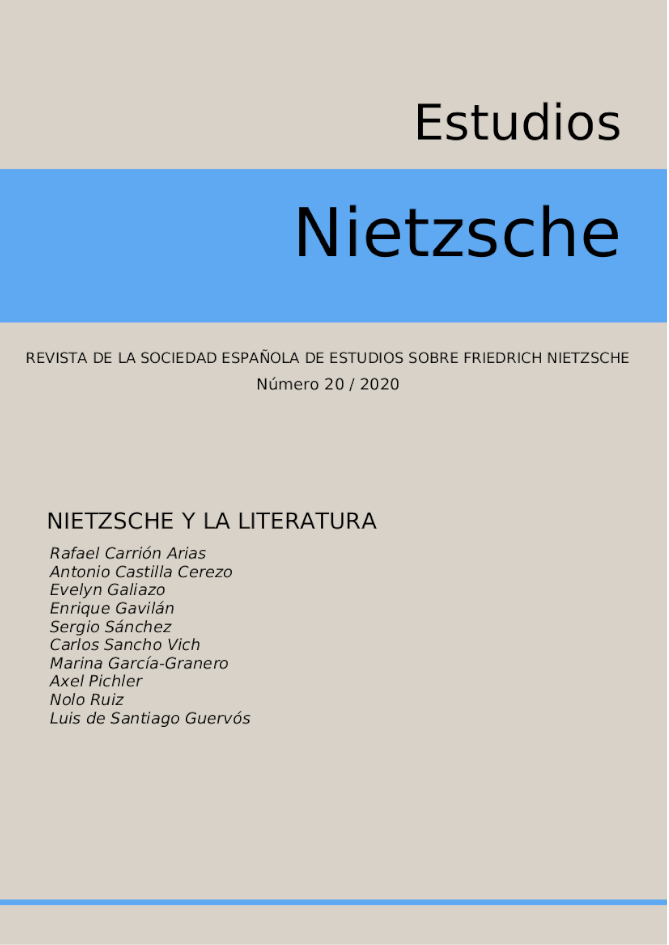A language that says nothing (and is never silent). Nietzsche’s influence on Michel Foucault’s literary theory
DOI:
https://doi.org/10.24310/EstudiosNIETen.vi20.9893Keywords:
Nietzsche, Foucault, philosophy, literatureAbstract
To show the main influences of Nietzsche’s thought on Michel Foucault’s literary theory, this article reviews the following four inversions: first, that of Lasswell’s communicative model; second, that of platonism; third, that of hegelianism; fourth and last, schopenhauerianism, (the latter, both in terms of metaphysics and aesthetics). It seemed to us that, in contrast to these references, not only Nietzsche’s influence on Foucault, but also Nietzsche’s position on the literary phenomenon, are remarkably clarified.
Downloads
Metrics
References
Blanchot, M., El espacio literario, trad. de J. Jinkins y V. Palant, Buenos Aires: Paidós, 1992.
Foucault, M., Entre filosofía y literatura. Obras esenciales, Volumen I, trad. de M. Morey, Barcelona: Paidós, 2003.
Foucault, M., De lenguaje y literatura, trad. de I. Herrera Baquero, Barcelona: Paidós, 1996.
Foucault, M., Dits et écrits I, París: Gallimard, 2001.
Foucault, M., Las palabras y las cosas, trad. de E. C. Frost, Buenos Aires: Siglo XXI, 2003.
Foucault, M., Raymond Roussel, trad. de P. Canto, Buenos Aires: Siglo XXI, 1999.
Hegel, G.W.F., Lecciones sobre la estética, trad. de A. Brotons Muñoz, Madrid: Akal, 2007.
Kojève, A., La concepción de la antropología y del ateísmo en Hegel, trad. de J. J. Sebreli y A. Llanos, Buenos Aires: Leviatán, 2007.
Lasswell, H.D., «Estructura y función de la comunicación en la sociedad», en M. De Moragas (ed.), Sociología de la comunicación de masas, tomo II, Barcelona: Gustavo Gili, 1985.
Nietzsche, F., Correspondencia I-VI. (CO). Director ed. Luis E. de Santiago Guervós. Madrid : Trotta, 2005- 2012.
Nietzsche, F., Fragmentos Póstumos I-IV (FP). Director ed. Diego Sánchez Meca. Madrid: Tecnos, 2006-2010.
Nietzsche, F., Obras Completas, I-IV (OC ). Director ed. Diego Sánchez Meca. Madrid: Tecnos, 2011-2016
Platón, Diálogos III, trad. de C. García Gual, Madrid: Gredos, 1988.
Schopenhauer, A., El mundo como voluntad y representación, Vol. I, trad. de R. Aramayo, Barcelona: Círculo de Lectores, 2004.
Downloads
Published
How to Cite
Issue
Section
License
As of issue 21 (2021) this journal is published only in open access (diamond route).
From that number 21, like the previous numbers published in NIETZSCHE STUDIES, they are subject to the Creative Commons Acknowledgment-NoComercia-ShareIgual 4.0 license, the full text of which can be consulted at <http://creativecommons.org/licenses/by-nc-sa/4.0 >
It is the responsibility of the authors to obtain the necessary permissions of the images that are subject to copyright.
This work is licensed under a Creative Commons Attribution-NonCommercial-ShareAlike 4.0 International License.
Copyright generates two different rights: moral rights and patrimonial rights that EJFB recognizes and respects. Moral rights are those relating to the recognition of the authorship. They are rights of a personal nature that are perpetual, inalienable, unseizable and imprescriptible as consequence of the indivisible union of the author and his/her work.
Patrimonial rights are those that can be derived from the reproduction, distribution, adaptation or communication of the work, among others.







11.png)
